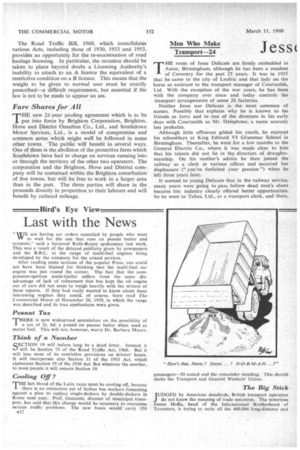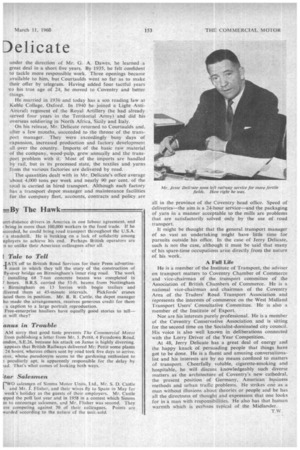Bird's Eye View
Page 46

Page 47

If you've noticed an error in this article please click here to report it so we can fix it.
By The Hawk
Last with the News
WE are having car orders cancelled by people who want to wait for the one that runs on peanut butter and creosote," said a harassed Rolls-Royce spokesman last week. This was a result of the delayed publicity given by newspapers and the B.B.C. to the range of multi-fuel engines being developed by the company for the armed services.
After reading some sections of the popular Press, one could not have been blamed for thinking that the multi-fuel car engine was just round the corner. The fact that the compression-ignition multi-fueller suffers from the same disadvantage of lack of refinement that has kept the oil engine out of cars did not seem to weigh heavily with the writers of these reports. If they had really wanted to know about these interesting engines they could, of course, have read The Commercial Motor of November 20, 1959, in which the range was described and its true applications were given.
Peanut Tax
-THERE is now widespread speculation on the possibility of I a tax of 2s. 6d. a pound on peanut butter when used as motor fuel. This will not, however, worry Dr. Barbara Moore.
Think of a Number SECTION 19 will before long be a dead letter. Instead, it will be Section 73 of the Road Traffic Act, 1960. But it will lose none of its restrictive provisions on drivers' hours. It will incorporate also Section 31 of the 1933 Act, which elaborates Section 19 of the 1930 Act. But whatever the number, to most people it will remain Section 19.
Cooling Off ?
THE hot blood of the Latin races must be cooling off, because there is no intimation yet of Italian bus workers fomenting against a plan to replace single-deckers by double-deckers in Rome next year. Prof. Guzzanti, director of municipal transport, has said that this change would be necessary to overcome serious traffic problems. The new hoses would carry 150
passengers-50 seated and the remainder standing. This should shake the Transport and General Workers' Union.
The Big Stick
JUDGED by American standards, British transport operators do not know the meaning of trade unionism. The notorious James Hoffa, head of the International Brotherhood of Teamsters, is trying to unite all the 400,000 long-distance and
tort-distance drivers in America in one labour agreement, and bring in more than 100,000 workers in the food trade. If he icceeded, he could bring road transport throughout the U.S.A. a standstill. He is banking on a lack of solidarity among nployers to achieve his end. Perhaps British operators are 3t so unlike their American colleagues after all.
t Tale to Tell
INTS off to British Road Services for their Press advertise' ment in which they tell the story of the construction of fly-over bridge on Birmingham's inner ring road. The work installing 68 7-ton concrete beams was completed in hours. B.R.S. carried the 53-ft. beams from Nottingham r Birmingham on 13 lorries with bogie trailers and :livered them at 45-minute intervals. Pickfords' cranes laced them in position. Mr. R. R. Cattle, the depot manager ho made the arrangements, receives generous credit for them a caption to a large portrait reproduction. Free-enterprise hauliers have equally good stories to tell— tit will they? •
anus in Trouble
AM sorry that good taste prevents The Commercial Motor from publishing a letter from Mr. Pettit, 4 Ferndown Road. ondon, S,E.26, because his attack on Janus is highly diverting. appears that British Railways delivered Mr: Pettit some plants . 24 hours', whereas others sent by road took five days to arrive. inus, whose pseudonym seems to the gardening enthusiast to !. peculiarly apt, is apparently responsible for the delay by aad. That's what comes of looking both ways.
;tar Salesmen
rwo salesnien of Simms Motor Units, Ltd., Mr. S. D. Castle I. and Mr. I. Flisher, and their wives fly to Spain in May for week's holiday as the guests of their employers. Mr. Castle pped the poll last year and in 1958 in a contest which Simms in to encourage salesmen, and Mr. Flisher was second. They ere competing against 70 of their colleagues. Points are warded according to the nature of the unit.sold,




































































































































